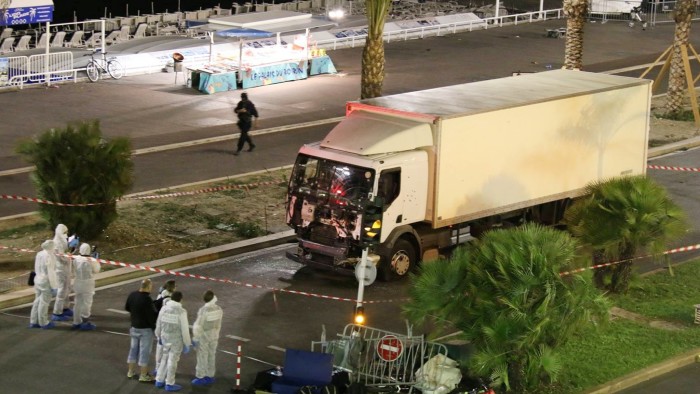Attack in Nice: France remains in terrorists’ crosshairs

Roula Khalaf, Editor of the FT, selects her favourite stories in this weekly newsletter.
There is something especially horrendous about the kind of mass murder committed last night in Nice: so easy to carry out and so hard to prevent.
One killer at the wheel of one heavy truck, ploughing for up to 2km through a crowd gathered on the Nice seafront to watch a fireworks display celebrating Bastille Day, an international emblem of liberty.
A celebratory crowd filled with families, and a reportedly high number of children among the (so far) 84 dead — the epitome of vulnerability.
France, of course, knew it was in the crosshairs of the jihadis who most probably inspired this atrocity, which was carried out by a man named by a person close to the police investigation as Lahouaiej Bouhel, a Tunisian with a French visa — and not just because of the Isis attack on Paris in November, which killed 130.
This week, for instance, and in the wake of last month’s jihadi attack on Ataturk international airport in Istanbul, the French diplomatic missions in Ankara, Istanbul and Izmir were closed and national day celebrations cancelled in light of “credible” terror threats. The Bastille Day festivities at the French ambassador’s residence in Beirut on Thursday evening were ringed by unprecedented security.
France has been a constant ally in the US-led air war against Isis, contributing hundreds of troops, including special forces, in ground and air operations in both Syria and Iraq, as well as a 900-strong peacekeeping force in Lebanon. All that is in addition to its significant deployment across sub-Saharan Africa.
European and Arab security officials say France has been the biggest source from Europe of volunteers to the Isis foreign legion but the jihadis have long sought to encourage disaffected Muslims to carry out “lone wolf” attacks on targets of opportunity. This horror in Nice, or the Orlando nightclub attack, appear to fall into that category, whereas last year’s assault on Paris, and this year’s attacks on Brussels and Istanbul airports, were carefully planned Isis operations that lethally combined terrorist and commando tactics.
Some analysts argue that Isis is striking further afield because of battlefield setbacks inside its self-declared caliphate in Syria and Iraq, as the US-led coalition aims to retake its “capitals” at Raqqa and Mosul, and is exploring co-operation with Russia to this end. But Isis started calling for lone wolf attacks two years ago, at the peak of its momentum and acquisition of territory. It was always part of the tactically flexible and multi-front Isis practice to launch far-flung attacks, and to switch between, as well as combine, regular and irregular warfare.
But terror attacks are likely to continue even as Isis territory shrinks — and French and other European cities will remain in the front line. Intelligence-sharing within Europe is still woefully inadequate, despite the gaping holes revealed by February’s Brussels attack, and may face further barriers as the EU’s model of co-operation comes under strain from for example Britain’s decision to leave the bloc.
The Nice killer, in any case, while reportedly known to French police for petty crime, was not on the intelligence radar. Whatever emerges from the investigation into this particular atrocity, as a politico-military phenomenon with a long and flexible reach, Isis is far from being on the run.
Comments